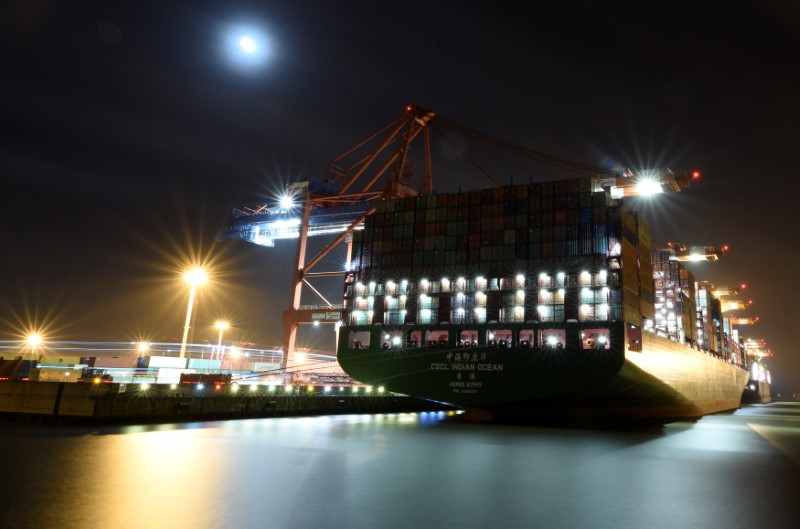 © Reuters. Long-exposure shows container ship at loading terminal in the harbour of Hamburg
© Reuters. Long-exposure shows container ship at loading terminal in the harbour of HamburgBy Michael Nienaber
BERLIN (Reuters) – The German economy will grow much more strongly than expected in 2017, expanding at its fastest rate in six years, the Ifo institute said on Friday, adding that the broad-based upswing would extend into next year.
Europe’s biggest economy is in the middle of a consumer-led upturn, helped by record-high employment, moderate inflation and ultra-low borrowing costs. Exports and company investments in equipment have kicked in as additional growth drivers in the past months.
Tax revenues and the state’s budget surplus are growing, which should improve Chancellor Angela Merkel’s chances of successfully concluding tricky negotiations on a three-way coalition agreement in coming days.
Ifo raised its 2017 growth forecast to 2.3 percent from 1.9 percent, its economist Timo Wollmershaeuser said, confirming a pre-release of a report by Der Spiegel magazine to be published on Saturday.
This would be the strongest growth rate since the 3.7 percent registered in 2011, when massive state spending followed the financial crisis and the global economic downturn.
The new Ifo estimate translates into a calendar-adjusted gross domestic product (GDP) growth rate of around 2.6 percent, Wollmershaeuser told Reuters, adding that he expected the strong upswing to carry on into 2018.
His comments followed data on Tuesday that showed a better-than-expected quarter-on-quarter expansion of 0.8 percent between July and September.
The government said last month it expected the economy to grow 2.0 percent in 2017 and 1.9 percent in 2018, unadjusted for calendar effects.
Merkel’s conservatives are struggling to forge a coalition government with the pro-business Free Democrats (FDP) and the left-leaning Greens, an alliance untested at national level.
Fusion Media or anyone involved with Fusion Media will not accept any liability for loss or damage as a result of reliance on the information including data, quotes, charts and buy/sell signals contained within this website. Please be fully informed regarding the risks and costs associated with trading the financial markets, it is one of the riskiest investment forms possible.
Source: Investing.com


























